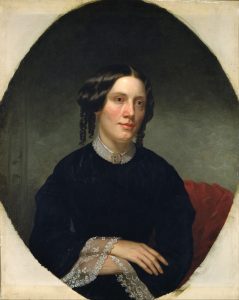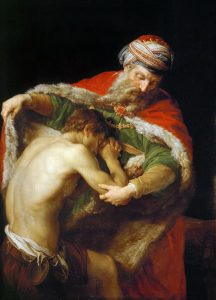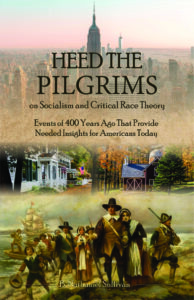Fairy tales do not tell children the dragons exist. Children already know that dragons exist. Fairy tales tell children the dragons can be killed.
—G. K. Chesterton—
Key points: It isn’t just fairy tales that can effectively encourage us and our children to stand on the side of what’s right. True stories have an especially powerful impact on us as they demonstrate the need for virtue and as they capture our imaginations and engage our hearts and emotions. The historical account of the Pilgrims’ experiment in socialism is just that kind of story, and Thanksgiving affords us many wonderful opportunities to share it. Before heading to Plymouth, however, perhaps we ought to make sure we really are convinced stories are powerful and persuasive.…
Growing up, Mark Hamby hated reading. Mark was born in 1955, and in 1977 at 22 years of age, he committed his life to Jesus Christ. It was at that point that Mark began to read books. Initially he began reading the Bible, but soon he also began to devour biographies of notable Christians. According to Mark,
I had never read a book other than the Bible but then a man named Charlie T. (Tremendous) Jones picked me out of an audience asking me what great Christian literature had been influencing my life. After seeing that I couldn’t think of a title, and after a total hysterically embarrassing moment, he sent me a dozen biographies.

Charlie Jones had told him, “You’ll be the same today as you’ll be five years from now except for the people you meet and the books you read.” The biographies Charlie sent Mark ignited a passion in Mark’s heart for reading that only has grown more intense over the years. Hamby first read a biography of
D.L. Moody, then George Mueller, then Amy Carmichael, then Gladys Alyward, and then Hudson Taylor and so on. The stories of these committed Christians influenced me so profoundly that I began to emulate their lives. Each book that I read gave me one more nudge forward in my faith. Within a year I was consumed with new thoughts and motivations that guided my passions for serving Christ and others.
Charlie Jones told Mark Hamby, “You’ll be the same today as you’ll be five years from now except for the people you meet and the books you read.”
The Genesis of Lamplighter
 Mark attended seminary and, naturally by this point, continued reading. Today, he serves as the president of a ministry he founded in 1994. Initially Mark named his organization Cornerstone Family Ministries, but eventually he renamed it Lamplighter. The term reflected his love for a book titled The Lamplighter, which was written by Maria Cummins in 1854.
Mark attended seminary and, naturally by this point, continued reading. Today, he serves as the president of a ministry he founded in 1994. Initially Mark named his organization Cornerstone Family Ministries, but eventually he renamed it Lamplighter. The term reflected his love for a book titled The Lamplighter, which was written by Maria Cummins in 1854.
As he continued to read, Hamby discovered books written many, many decades ago that not only captivated his interest but also upheld Christian and biblical values. The Basket of Flowers, a story written by German writer Christoph von Schmid in 1823, was one of the first, if not the first, book of this nature to capture Mark’s interest. Mark recalls,
It’s a story for young girls that I read to my daughter when she was just 12 years old. As I read it, I had to fall to my knees and cry. This book expressed so wonderfully how to be a godly father and it did it with such a depth of wisdom. I’d never read anything like it, and God used it to make me a much better father.

Biblical values, you see, are timeless. Realizing that A Basket of Flowers was full of insights that would benefit Christian families today, Hamby contacted a number of Christian publishers to encourage them to reprint von Schmid’s work. They weren’t interested, but Mark kept thinking about, talking about, and recommending “the best book I had ever read” to those with whom he spoke and interacted. He determined he would publish it himself. A year after it was released, Mark’s ministry had sold 2,000 copies of its edition of The Basket of Flowers. The following year, it published five more titles. Lamplighter has grown steadily since. In Mark’s own words,
Lamplighter Publishing started with me talking about the books I was reading and how God was using them to shape my life.…The books we accept still have to pass the same test they had to pass with that first book—to get published by us, a book has to hold me on the edge of my seat. It’s got to be one that I can’t set down.

Further, all the books and stories Lamplighter publishes help instill in readers and hearers godly character traits. The vast majority of them were released initially in a different era, one in which the culture and society valued and upheld traits such as courage, honesty, integrity, frugality, patience, and self-control — all qualities Scriptures uphold and affirm. The Bible, which, of course, has true stories of its own that instill virtues in its readers, had left its mark on the culture, and the society still embraced that influence. Generally speaking, Lamplighter books were bestsellers when they first appeared, many of them over a century ago.
The Culture Has Changed, but the Human Heart Has Not
If you are tempted to think godly values and virtue can’t be promoted effectively in riveting stories, don’t allow yourself to be misled. They can be and they are. Lamplighter Publishing now offers over 200 stories that do just that. Parents read these books to their children, who eagerly await hearing what will happen to the characters with whom they have readily identified. The books are changing lives and family relationships for the better. Let’s hear again from Mark Hamby himself:
I’ve had moms and dads write to me saying that [their family story time is] the most important time of their day, whether it be early morning or late at night. What is happening is that the children and the parents are not just reading the story, but they’re discussing it. They’re saying:
-
-
-
- What would we do if this were to happen to us?
- Would we be able to trust God?
-
-
So it’s creating not just a story time. It’s creating a family time of really preparing for the future. What would happen to us if God allowed us to go through this particular circumstance?
Note this also. The ministry now publishes more than books.
-
-
-
- It offers more than 2-dozen of its published stories in an audio theater format (CDs and digital downloads). These dramas are excellent presentations involving professional actors and state-of-the-art music and sound effects. They are as riveting as their printed counterparts.
- Through its Masters Guild program, Lamplighter offers classes and training for young people at its headquarters in Mount Morris, New York. How can an individual use his or her artistic and dramatic skills and talents to further God’s purpose in his or her life, and to further God’s message in the world? The Guild is an experience that guides a Christian young person in this important quest.
-
-
Lamplighter Ministries exists “to make ready a people prepared for the Lord, by building Christ-like character one story at a time.”

It is no surprise, then, that Lamplighter Ministries exists “to make ready a people prepared for the Lord, by building Christ-like character one story at a time.” Thus, the work of Lamplighter Ministries offers hope for the future of America and Western culture.
Are you still skeptical? If, after hearing the story of Mark Hamby’s transformation and his ministry, you don’t believe a story, or that stories, can have that great an impact on a society or culture, consider the widespread transformative influences that these books had, and have had, on the societies and cultures of the day in which the authors lived, and beyond.

Of Uncle Tom’s Cabin, Christian statesman Charles Colson said this:
Probably no other novel has made such an impact on a nation. Uncle Tom’s Cabin sold 300,000 copies in its first year and two million copies by the end of the decade. These are incredible figures, considering that America’s population was less than a tenth of the size it is today. The book helped millions of Americans understand, for the first time, what a terrible thing it was to be a slave. Today, “Uncle Tom” is a derogatory term, applied to blacks that treat whites with fawning servility. But in Harriet Beecher Stowe’s novel, Tom is a Christ-like figure. He suffers the worst evils imaginable, yet refuses to strike back. The book seared the consciences of Stowe’s readers, and helped them realize that slavery was a great evil, not merely a problematic social institution. Anti-slavery activists had been trying to get that message across for almost thirty years. But nothing they did had the impact of this book. In fact, most abolitionists didn’t read novels. Like Charles Finney, they considered novels frivolous, if not downright immoral. The last place they would have looked for help in their cause was the bookstore fiction shelf.
Anti-slavery activists had been trying to get that message across for almost thirty years. But nothing they did had the impact of Uncle Tom’s Cabin.
—Charles Colson—
Stories Can Accomplish What Mere Arguments Cannot
Christians today need to take a cue from Mark Hamby and realize the persuasive power of stories. Because of their emotional appeal, stories can convince many people of ideas and ideologies that mere arguments, reason, and logic cannot. This is especially true of
-
-
-
- true stories like the Christian biographies that so profoundly influenced Mark Hamby,
- true-to-life stories like Uncle Tom’s Cabin and the numerous books that Lamplighter Ministries has republished, and
- stories that obviously have fictional elements yet that still clearly are based on enduring truths and virtues. A Christmas Carol and C. S. Lewis’s The Chronicles of Narnia can be found in this category. Undoubtedly, so can a number of Lamplighter books
-
-
History Is One Big Story

This is a huge reason why history must be taught accurately and with an understanding of the cultures and customs in which past events occurred. It’s also why leftists so fervently desire to revise history. And it’s a big reason why Jesus taught in parables. Yes, of course He spoke in parables so that those open to spiritual truths could grasp their meanings, and so those resistant to spiritual truths would fail to understand. Jesus said this directly in Matthew 13:10-17. At the same time, the parables Jesus told had a profound impact on those open to the things Jesus had to say. Jesus’ hearers could remember them! They could see the correlations between the parables and the spiritual realities they conveyed. The stories hit home, both powerfully and personally.
Here are twelve things that make stories especially powerful. They
-
-
-
- engage the reader or hearer,
- ignite learners’ imaginations,
- creatively inform,
- impress readers’ and hearers’ minds, making it easy for those reading and listening to remember,
- invite or solicit involvement (even if it’s imaginary involvement) in the situations presented,
- provoke interest,
- provide connection through experiences,
- appeal to the emotions, to the heart,
- educate through the side door instead of the front door,
- penetrate distractions to get the main message through,
- entice rather than coerce, and
- encourage investigation.
-
-
The Incredible Persuasive Power of the True Story of the Pilgrims’ Failed Experiment in Socialism
Recall the three items we cited in the last section that reflect and affirm just how powerful true and true-to-life stories really are.
-
-
-
- History must be taught accurately.
- Leftists push relentlessly to revise history.
- Jesus taught in parables.
-
-
 Let’s hone in on the first of these for just a few moments, and then we’ll be done. History is replete with lessons warning about the dangers of socialism and its siblings — Communism and Marxism. One of the most powerful of these is embedded in Governor William Bradford’s account of the Pilgrims. Bradford was governor of the Plymouth Settlement for many years. His work is titled “Of Plymouth Plantation.”
Let’s hone in on the first of these for just a few moments, and then we’ll be done. History is replete with lessons warning about the dangers of socialism and its siblings — Communism and Marxism. One of the most powerful of these is embedded in Governor William Bradford’s account of the Pilgrims. Bradford was governor of the Plymouth Settlement for many years. His work is titled “Of Plymouth Plantation.”

Significantly, for two years — from 1621-1623 — the Pilgrims lived under a communal system. This occurred because of the agreement the settlers had made with those in England who had invested financially in their voyage across the Atlantic and their efforts to settle in the New World. No one owned any property privately; all that was produced and consumed was put into and taken out of a common store. The system almost brought an end to the Plymouth settlement, and it would have done just that had Bradford and his fellow settlers not changed their approach and switched to a free market model of work and payment. Bradford’s story of the Pilgrims’ experiment in socialism needs to be retold in our day! Many people have recounted the highlights of their experiences, but additional details need to be told as well.
William Bradford’s account of the Pilgrims’ experiment in socialism needs to be retold in our day!

Furthermore, because Bradford’s English is antiquated by 21st-century American standards, it is difficult to understand. In 2019 I paraphrased Governor Bradford’s account in a Word Foundations blogpost titled “Ditching Socialism in the New World: A Lesson for 21st-Century Americans.” You can access the article here. In 2023, just prior to Thanksgiving, I published that very article in chapter 1 of a new book, Heed the Pilgrims on Socialism and Critical Race Theory. Chapters 2 and 3 explore the relationships of the Pilgrims with their Native American neighbors, and the respect they had for them. The Pilgrims clearly were not racists but held the Native Americans in high esteem.
This true story is an extremely powerful tool that effectively warns readers about the lethal dangers of socialism and CRT — ideologies that, ominously, have gained a great deal of popularity among young people today.
Do not underestimate the power of a story, especially one like this. It has the potential to change the destiny of our nation by setting her once again on the right path.
After all, stories — especially those that are true and true-to-life — change lives. They really do.
Just ask Mark Hamby.
Copyright © 2021 by B. Nathaniel Sullivan. All rights reserved.
Unless otherwise indicated, Scripture has been taken from the New King James Version®. Copyright © 1982 by Thomas Nelson, Inc. Used by permission. All rights reserved.


Be First to Comment